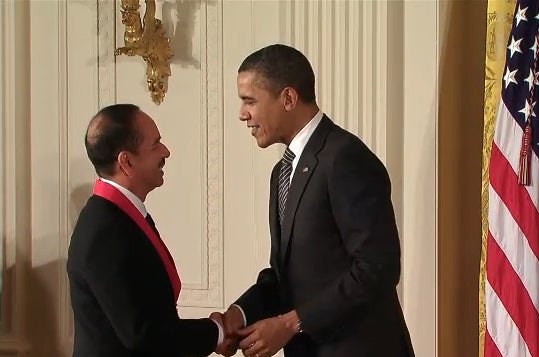|
February 16, 2012
President Obama gives the National Humanities Medal to Stanford literary scholar Ramón Saldívar
Saldívar receives a 2011 National Humanities Medal in honor of his cultural explorations of the U.S-Mexico border. By Corrie Goldman

Ramón Saldívar receiving the National Humanities Medal from President Obama. (Photo: Courtesy of whitehouse.gov) In a White House ceremony on Monday, President Obama awarded a National Humanities Medal to Stanford English and comparative literature Professor Ramón Saldívar.
His teaching and research, centering on globalization, transnationalism and Chicano studies, were recognized for "his bold explorations of identity along the border separating the United States and Mexico."
"You've helped guide our growth as a people," Obama told the nine medal winners. The awards are for outstanding achievement in history, literature, education, philosophy and musicology. This year's recipients include poets, historians and philosophers.
The medals are described as honoring those whose work deepens the nation's understanding of the humanities. Saldívar, the Hoagland Family Professor in Humanities and Sciences at Stanford, was selected by the National Endowment for the Humanities for his literary analysis, which "beckons us to notice the cultural and literary markings that unite and divide us."
Saldívar was in the midst of preparing to teach his Literature of the Americas class last week when he received an unexpected phone call from James Leach, the chairman of the National Endowment for the Humanities. When Leach said he was calling to bestow the National Humanities Medal on behalf of the president, Saldívar wondered if Leach had reached the right Ramón Saldívar. After Leach assured him that the call was the real thing, Saldívar was both "completely blown away and deeply moved by the honor."
Saldívar said the award felt a bit unreal until he shared the news with his students in the classroom and they began clapping and cheering. "Their joy brought the magnitude of it home to me."
Saldívar said that the medals highlight "the importance of the arts and humane disciplines for maintaining vibrant intellectual and creative activity at the core of U.S. civic life."
At Stanford since 1991, Saldívar has served as chair of the Department of English and the Department of Comparative Literature. He was the university's first vice provost for undergraduate education, a post he held from 1994 to 1999. He was appointed the sixth director of Stanford's Center for Comparative Studies in Race and Ethnicity in September 2011.
Raised in the border town of Brownsville, Texas, Saldívar has had an interest in transcultural issues since he began his academic studies. His research interests span areas of cultural studies, literary theory, Chicano narrative and post-colonial literature. In The Borderlands of Culture: Américo Paredes and the Transnational Imaginary, Saldívar delves into the work of scholar Américo Paredes, a pioneer in the field of Mexican-American border studies. His earlier work, Chicano Narrative: The Dialectics of Difference, chronicles the significant but relatively unexplored genre of literature produced by Mexican American communities of the American Southwest in the 19th and 20th centuries.
In his current research, Saldívar is focusing on the topic of race and narrative theory in relation to the question of literary form and history. His work in progress, tentatively titled Race and Narrative Theory in Contemporary American Fiction, will explain how 21st-century U.S. ethnic writers have initiated a new stage in the history of the novel.
Humanities scholarship at Stanford was also recently recognized by Times Higher Education. The publication's rankings of the world's leading universities cited Stanford's Pulitzer Prize winners and MacArthur Fellows as "leading its liberal-arts program" and placed Stanford in the top spot on the list of best universities for study of the arts and humanities.
For more news about the humanities at Stanford visit the Human Experience: http://humanexperience.stanford.edu/
-30-
|